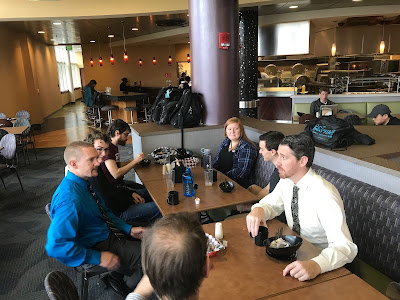 |
| Mr. Christopher Foust with freshman Devin Stipe |
Mr. Foust graduated from Virginia
Commonwealth University with a MS in biology, where he focused on biodegradable
plastics. It was here where he first
entered the education field by working as a graduate lab instructor for biology. After graduating, he then worked with Capital
One in their adult education department, teaching ethics and customer
service. Through these experiences, he
developed a love for teaching and subsequently participated in the Virginia
Department of Education’s Career Switcher Alternative Route to Licensure
Program at the University of Virginia to gain teaching licensure in biology and
physics. In 2003, he was hired by
Henrico and was posted at Hermitage High School, where he has remained ever
since.
 |
| Receiving the JMU HSPToY Award from Dr. Christopher Hughes |
As an educator, Mr. Foust’s greatest
struggle lies not in the teaching or in interacting with students, but more
with administrative tasks he may have to do.
His advice for getting through this work is to attack the most
unpleasant or arduous tasks upfront and toughing them out. While they’re far from the most fun, once
they’re done, Mr. Foust notes that you’re free to do whatever you like
after. And if what you like is making
physics classes enjoyable and getting people excited about learning the content,
Mr. Foust has a great approach!
When
it comes to getting students curious and driven to learn about physics Mr. Foust
states that one of his best assets is in showmanship. He has a “demo-a-day” approach where every
day a new concept is introduced with a small but strange phenomenon and later
explored in more detail. An example
would be the classic tablecloth yanking party trick to introduce friction. It serves as something students may have
already seen, is easily scalable for classrooms, and is novel but simple to get
students trying to figure out what exactly is going on. Another example of a demo would be hitting a
textbook on his hand with a hammer to introduce the concept of pressure. These demonstrations serve to make physics
more accessible and more engaging to students, easing them into the subject
while still teaching them the underlying concepts.
 With technology becoming a much more
integral part of the public education system, Mr. Foust sees much potential for
growth in using these new tools in and out of the classroom. He often uses the University of Colorado,
Boulder’s PhET Lab simulations as a pre-lab activity for students, and there are
many more tools that he hasn’t yet explored.
Another place for growth is in student-led instruction and flipped
classroom methods, where Mr. Foust notes that some of the most meaningful
learning occurs when one student explains a concept to another.
With technology becoming a much more
integral part of the public education system, Mr. Foust sees much potential for
growth in using these new tools in and out of the classroom. He often uses the University of Colorado,
Boulder’s PhET Lab simulations as a pre-lab activity for students, and there are
many more tools that he hasn’t yet explored.
Another place for growth is in student-led instruction and flipped
classroom methods, where Mr. Foust notes that some of the most meaningful
learning occurs when one student explains a concept to another.
We also got to hear a bit about Mr.
Foust’s philosophy as an educator, and a bit of where it comes from. Mr. Foust never took physics in high school
himself, and he knows how large of a roadblock physics’s notoriety as a
difficult subject can be to students taking and enjoying his class. To this end, he believes in reassuring his
students that the class isn’t going to be a straight lecture, using humor,
experiments, and physics magic to get students to relax and engage with the
subject. He also believes deeply in
letting students work together. He
structures many of his labs with more open-ended procedures, trying to get
students to work together to figure out how they can achieve the goals for the
lab that Mr. Foust sets. He doesn’t believe
that you need to be the greatest mathematician entering the class, nor in
leaving it, but what matters the most is in understanding the concepts
presented by physics, and their implications in the world. For example, he often makes connections to physics
with the physiology and anatomy class he teaches, harkening back to his
experience with biology and also relating the material to a class that many of
his students are concurrently taking.
Mr. Foust’s greatest source of pride
in his career hasn’t been a fancy award or title. It’s been in what he sees in the students. When he’s able to inspire a student to pursue
physics, or when a student finally gets just why physics is cool, Mr. Foust
notes it’s one of the most satisfying feelings as a teacher. He notes one of the most amazing moments as
being when you have students during a more idle period, either in-between
classes or at lunch for example, where they could talk about anything in the
world, and yet they are arguing about what happens in physics or why something
in the world happens because of physics. Mr. Foust’s greatest joy in teaching has
really been in learning from the students, letting the students explore and
discover how to approach concepts in ways that he wouldn’t have thought of
before.
Thank you again to Mr. Foust for
visiting the JMU Department of Physics and Astronomy, and especially for being
a fantastic educator. We certainly don’t
present the High School Physics Teacher of the Year Award lightly, and it’s
always wonderful to get to know and share the impact that a great teacher has
on our students. Another thank you as
well to Devin Stipe for nominating Mr. Foust, and we hope to see more fantastic
physics educators in the future!






